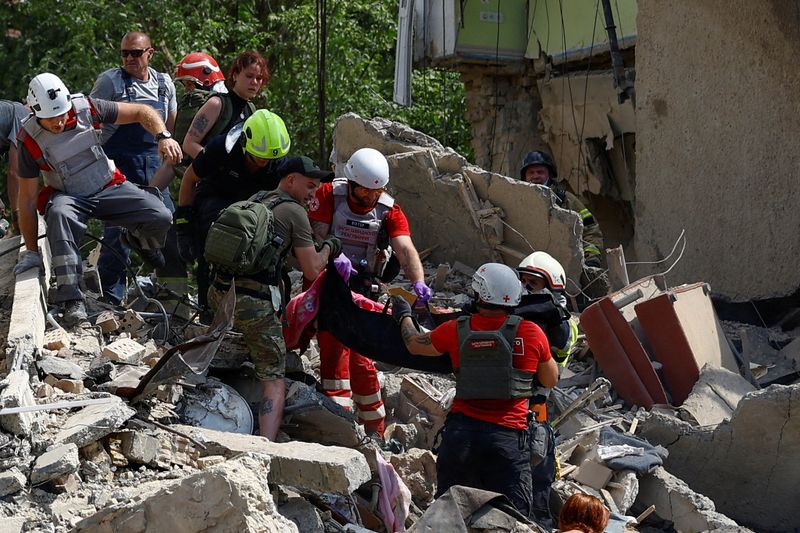By Anastasiia Malenko
KYIV (Reuters) - Oleh Holubchenko's team was in the middle of surgery on five-month-old Taras when an explosive wave sent the medics flying across the room.
Shards of glass tore into Holubchenko's back and his colleague Ihor Kolodka's face. The baby remained in place on the table, surrounded by shattered equipment and five bleeding adults.
"Is everyone alive?" Holubchenko recalls shouting.
Anaesthesiologist Yaroslav Ivanov grabbed the manual resuscitator to keep the baby breathing after the ventilator broke. Worried the ceiling would collapse, some members of the team ran to the basement with Taras.
These were the dramatic moments after a missile struck Okhmatdyt children's hospital in central Kyiv on Monday, an assault that shocked Ukrainians and prompted angry condemnation from Kyiv and its Western allies.
The U.N. said on Tuesday there was a "high likelihood" the hospital took a direct hit from a Russian missile during a series of airstrikes on Ukrainian cities that have killed at least 44 people. The Kremlin has said, without providing evidence, that it was Ukrainian anti-missile fire, not Russia, that hit the hospital, large parts of which were reduced to rubble.
Two adults were killed at Okhmatdyt and dozens wounded. Many patients, relatives and staff had fled to basements in time to avoid the worst of the blast.
"For me, Okhmatdyt was the safest place for kids and adults. On that day, I realized there are no safe spaces left anywhere," Ivanov, 39, told Reuters over the telephone on Tuesday as he recovered from concussion and cuts.
When they reached the basement, Ivanov and his colleagues found a room free of smoke and away from the screams of the injured.
There they brought the baby back to consciousness and handed him over to a team of doctors to continue the surgery at another hospital.
STRAIGHT BACK TO WORK
As Holubchenko and Ivanov took care of Taras, Kolodka took out shards of glass from his face and then rushed outside to see how he could help. He saw that the toxicology department had been flattened.
"Since I was not bleeding anymore, I went outside to keep helping the injured and deal with the aftermath of the missile strike," Kolodka said.
"In the moment, we didn't think about whether it was easy or difficult - we were just doing our job and trying to help."
After helping rescue workers and soldiers sift through the rubble for the rest of the day in the dust and heat, he returned home to find there was no power. Electricity outages are now common across the country as Russia targets the energy system.
Kolodka woke up at 5 a.m. to take a shower before heading back to work. Holubchenko also returned to the hospital on Tuesday.
"I had to go because there was a meeting with colleagues, to see what was happening with the department and check all the equipment," Holubchenko said. "I ... connected with colleagues from the other hospital to ask about the state of the baby."
Taras was doing fine after his surgery, he was told.
The team was heartened by support and gratitude from patients and the broader community as they battled exhaustion.

Work to repair the hospital was underway within hours of the blast as hundreds of volunteers joined the effort to clear broken glass, rubble and damaged equipment.
"It is nice to see how united our people are," said Kolodka.